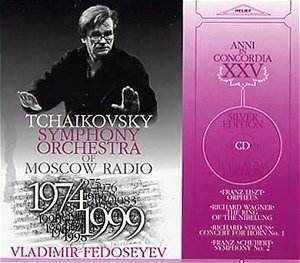Fascinating programming here, with some favourite
‘bleeding chunks’ hewn from Wagner’s mammoth Ring, juxtaposed
with three lesser-known pieces from three Masters.
Liszt’s symphonic poem, Orpheus, formed
part of Fedoseyev’s very first concert with the Tchaikovsky Orchestra
in 1974, and here is the (presumably) studio version of the same
year (how can it be DDD, as the box claims, though?). Fedoseyev’s
essentially Romantic temperament suits this music to the ground.
Despite the recording date, clarity is superb (listen to the low
bass oscillations around 7’50). This is a very fine performance
indeed, topped with a fully authentic Russian trumpet around the
nine-minute mark. Sensitivity to Liszt’s harmonic world is all
to Fedoseyev on the strength of this reading. If one looks elsewhere
for Liszt tone-poems, it is true that Haitink on Philips provides
eminently serviceable library recommendations (Philips Duo 438
751-2 includes Orpheus), but Fedoseyev’s belief in Liszt’s
inspiration shines through the performance.
The Wagner brings a surprise in the form of the
‘Ride of the Valkyries’. I don’t know what those girlies are on,
but it sure makes them go. This is the most breathless Walkürenritt
I have ever heard – the brass deserve high praise for just keeping
up with this dizzying pace. A real ‘Sprint of the Valkyries’.
There seems to be a clumsily managed edit at 1’08.
Forest Murmurs is not quite so breathless,
thankfully. There is some lovely solo violin playing (around 3’33),
marred only by the close miking, and sterling solo work also comes
from the oboist and (to a marginally lesser extent) the solo clarinettist.
Still, it has to be admitted that this is ‘outdoor’ music from
a somewhat rough outdoors. Neither Wagner snippet prepares the
listener for Siegfried’s Funeral March from Götterdämmerung,
though. There is an awe-inspiring sense of inevitability here;
the end is magnificent, dying away hauntingly into nothing.
Victor Galkin was horn soloist with this orchestra
in 1983, when the recording of Richard Strauss’ youthful First
Concerto was made. This concerto lies in the shadow of the much
later Second Concerto (the acid test of any horn player’s technique),
yet as these performers set out to prove, it is a marvellous piece
in its own right. The first movement is fundamentally lyrically
conceived here (Galkin’s tasteful vibrato is not distracting in
the least), leading naturally to the concertos crowning glory,
the Andante. Galkin plays with a seamless legato. Perhaps the
finale is not the virtuoso showpiece some might want it to be,
but the ‘recitative’ (around 13’24 here, as the concerto appears
as one track) works extremely well dramatically and prepares the
way for the coda, here not the sprint it so often is.
Schubert’s Second Symphony (here listed as ‘Op.
125!) is given from a large-orchestra, Romantic perspective. Authenticists
beware, but if you are not averse to this style of performance
there are rich rewards. Taken on its own terms, this is entirely
convincing, especially the wonderfully robust Menuetto. Admittedly
the finale is not as sunny as it could be, but there is an interesting
element of Schubertian ‘Sturm und Drang’, almost as if this were
Haydn arranged (lots) by Schubert.
A fascinating disc from every angle. Even if
none of the performances are definitive in themselves, the whole
is greater than the sum of the parts.
Colin Clarke
